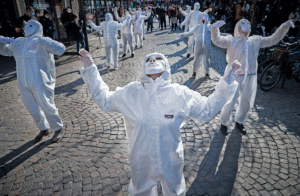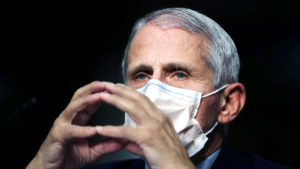Last week, a group of scientists, doctors, and academics published an open letter calling on Spotify “to take action against the mass-misinformation events which continue to occur on its platform”. Specifically, they were objecting to two recent episodes of Joe Rogan’s podcast, in which he interviewed the prominent vaccine sceptics Dr. Peter McCullough and Dr. Robert Malone. “By allowing the propagation of false and societally harmful assertions,” the letter claimed, “Spotify is enabling its hosted media to damage public trust in scientific research.”
I am an associate professor of epidemiology and biostatistics, as well as a practising physician, and I firmly believe that it would be a mistake to censor Rogan under the guise of combating “misinformation”.
Rogan is not a scientist, and, like everyone else, he has his biases. But he is open-minded, sceptical, and his podcast is an important forum for debate and dialogue. It is not enough, moreover, to simply dismiss Malone and McCullough as conspiracy theorists. They are controversial and polarising figures, but they do have real credentials. Malone is a physician who has worked in molecular biology and drug development for decades, while McCullough was, until recently, an academic cardiologist and researcher.
Both speakers made accurate and useful points on Rogan’s podcast — as well as unsupported, speculative, alarmist, and false ones. The correct way to deal with incorrect ideas in biomedicine, if they rise to a level of prominence that warrants rebuttal, is to rebut them.
In what follows, I attempt to assess their main claims, explaining what they get right and what they get wrong. I cannot address every point that the two of them made — both episodes are close to three hours long — but I hope that I can provide some clarity in a debate that often lacks it.
Claim: The risks of mRNA vaccination are underdiscussed and boosters should be debated
Early in his interview, Malone is critical of the scientific and media discussion of vaccine safety, noting that “no discussion of risk is allowed”. Later, he says that the pejorative label of “anti-vaxxer” is used to stifle legitimate debate over vaccines. Malone and McCullough both warn that mRNA vaccines, such as Pfizer and Moderna, can cause myocarditis, especially in young men who are at low risk from the virus. Given these and other alleged risks, they warn against recommending — or requiring — boosters for the general population.
I believe they are correct in these sentiments. In April 2021, the first reports of myocarditis were noted in Israel, with the majority of cases occurring in young men who had recently received an mRNA vaccine. Since then, the evidence for vaccine-related myocarditis has grown. We know now that boys are more likely to be affected than girls. We know that Moderna has higher rates than Pfizer. We know that dose two causes more myocarditis than dose one. The precise estimate of risk is now thought to be between 1 in 3,000 to 6,000 for males in the target range (roughly age 12 to 30), and researchers have shown that the CDC’s method to study this underestimates myocarditis risk.
Such concerns are not limited to the fringe. Marion Gruber and Phil Krause, the former director and deputy director, respectively, at the US Food and Drug Administration, resigned last autumn over White House pressure to green-light boosters. Paul Offit, a prominent vaccine advocate and the director of vaccine communication at the Children’s Hospital of Philadelphia, recently told the Atlantic that he advised his own 20-something son not to get boosted. Other nations are taking the myocarditis concern seriously, too. Several have banned or discouraged the use of Moderna in young men. Others advise two doses spaced further apart, and some have held off on a second dose entirely for younger age groups.
It is perfectly valid to question the wisdom of boosters, at least in young people, though I do think they are beneficial for older and more vulnerable people. Like Malone, I have seen researchers smeared as “anti-vaxxers” for simply suggesting that myocarditis is a real safety concern, or that we don’t know the optimal duration and dosing strategy of vaccination, particularly for young and healthy people and those who have recovered from infection. Malone and Rogan are correct that the media dismisses concerns over myocarditis by claiming that most cases are “mild”, when in fact it is too early for us to know the full effects. And I agree that this is an area of live debate that has not been adequately covered by the media.
Claim: Vaccines have lots of other dangerous side effects
At other points in his interview, Malone alludes to many potential side effects of vaccination, claiming it can result in seizure and paralysis, and that the menstrual irregularities associated with the vaccine suggest it is a “major threat to reproductive health” for women. He suggests that vaccination can suppress T cells, raising the risk of unusual cancers.
To date, I have seen no evidence to support any of these claims, and I believe it is a mistake to raise them. First, they are irresponsible — Malone’s rhetoric verges on fear-mongering — and second, they distract from his legitimate points on myocarditis in young men.
McCullough suggests that vaccine-related deaths and injuries in the US are severely underreported by the Vaccine Adverse Event Reporting System (VAERS). While I agree that there are problems with VAERS, I find it difficult to believe the numbers McCullough offers of 45,000 dead and 1 million injured. Here is why.
VAERS is a voluntary collection network that is prone to two types of biases. First, it may undercount vaccine-related events because providers did not recognise them or lacked motivation to report them. But it can also overcount them. Bad things can happen after vaccination, such as heart attack, that are entirely coincidental but that still might be reported.
Trying to find safety signals due to vaccination requires comparison against base rates, or how many events are expected to occur without vaccination. Even very unusual events, such as the blood clots that happened after the Johnson & Johnson vaccine, stand out fast. Similarly, elevated myocarditis rates in young men, especially after dose two of Moderna, jump out of the data.
Death signals are trickier to parse, and require knowledge of the ages and medical problems of people getting vaccinated. Even then, they must be weighed against data that shows vaccines reduce a big cause of death — death from Covid-19. For these reasons, I think it is premature and misleading to talk suggest that the vaccine caused 45,000 deaths. If McCullough wishes to make this case, the best forum would a scholarly publication, where other researchers can examine and critique his methodology.
Claim: US vaccine policy ignores the science on natural immunity
Malone and McCullough both make valid points that vaccine policy has not accommodated scientific knowledge of natural immunity. Should vaccines be required for people who have already been infected with Covid? If a healthy young person had one dose of the vaccine and then got Omicron, do they need a second? What if a person had two doses and Omicron — should they need to receive a booster, as some workplaces now require? These are open and legitimate questions.
Proponents of vaccines and boosters for those with a prior Covid-19 infection often point to antibody titers — blood tests showing that a recently vaccinated or boosted person has higher levels of Covid-19 antibodies than someone with natural immunity. But this is not persuasive.
Antibodies are a means to a clinical end, which is preventing someone from getting re-infected, becoming very sick, becoming hospitalised, or dying. Antibodies, especially in the short term, are bound to be higher the more you dose an individual, but the scientific burden is to show that these doses further improve the clinical endpoint in randomised studies. This burden has not yet been met.
Yet, here too, Malone goes over the top. He and Rogan refer to “multiple studies” showing that those who get vaccinated after being infected with Covid are at a two-to four-times greater risk of having an adverse reaction to the vaccine; later, Malone describes Rogan’s friends who are encouraging him to get vaccinated as asking Rogan to put himself “at higher risk” and “take more risk for your health in order to join their club”. There is a dialogue to be had about whether Rogan might benefit from zero, one, or two doses, but the overall risks of vaccination remain low, particularly for a 54-year-old man such as Rogan.
At times, Malone refers to accurate studies, but I worry the audience draws the wrong inference. Malone, for instance, claims that natural immunity is six to 13 times more effective than the vaccine at preventing hospitalisation and 27 times more effective against developing symptomatic disease. I assume he is referring to this August 2021 study from Israel. This study does indeed suggest that natural immunity is more protective than vaccines against the Delta variant, though it also suggests that natural immunity plus a single vaccine dose is more protective than natural immunity alone.
While this has implications for the number of doses a Covid-19 survivor might consider getting, it should not be misconstrued to mean that infection is preferable to vaccination for an adult who has yet to experience either. Vaccination is almost surely preferable for most un-immune adults.
At one point in his interview, Malone says: “Think twice about giving these jabs to your kids.” While I can understand how many will be angered by this statement, the truth is other nations, such as the United Kingdom, are thinking twice — at least for healthy 5 to 11-year-olds, the group with the lowest risk of bad outcomes from Covid. As of this moment, the UK’s advisory panel has said that only 5 to 11-year-olds with comorbidities should get vaccinated.
Claim: Effective early treatments, including hydroxychloroquine and ivermectin, are being suppressed
McCullough and Malone are proponents of early treatment for Covid-19, specifically with ivermectin and hydroxychloroquine. Both allege that public health authorities have intentionally suppressed the use of these drugs. McCullough states that early in the pandemic, “there was no focus on sick patients”, while Malone speculates that hospitals don’t want early treatments because they profit when people are hospitalised and claims that “probably half a million excess deaths” have happened in the United States through the intentional blockade of early treatments.
These are entirely false and insulting allegations, and Malone’s in particular are flat-out conspiratorial. Academic hospitals attempted all sorts of disparate treatment protocols in the hopes of helping sick patients. Many physicians did not wait for randomised control trials — the gold standard of medicine — to act; they simply acted. In fact, a Harvard hospital recommended hydroxychloroquine prior to randomised data.
The problem was not that there was no appetite for early treatment. The problem was that when the randomised trial data came in, they suggested the drugs favored by Malone and McCullough were ineffective. A pooled analysis of all such studies by Axfors and colleagues suggests patients treated with chloroquine and hydroxychloroquine had increased risk of death.
And ivermectin has not shown persuasive evidence of benefit in randomised trials to date. Of course, a randomised trial cannot prove that a therapy can never work under any circumstances, just as you cannot prove that Santa Claus doesn’t exist. But the burden is on proponents to show when and how their therapy helps, and they have not met it.
Rogan, Malone and McCullough are wrong to claim that ivermectin and hydroxychloroquine are known to be secretly effective, but they are correct that these drugs have been unfairly demonised. The truth is that they are neither particularly dangerous nor effective. The media labelling ivermectin a “horse drug” or “horse dewormer” was particularly absurd. Ivermectin is a well-known drug taken by humans all over the world.
Claim: Public debate over Covid-19 is often unfairly censored
Malone, Rogan, and McCullough are all correct on one topic: there is an effort to suppress information and censor debate on social media. The clearest example is that for more than a year, Facebook banned all discussion of the lab-leak hypothesis, until articles by Nicholson Baker, Nicholas Wade, and Donald McNeil broke the dam. This was a remarkable suppression of free speech.
Previously, I investigated the mechanism by which Facebook polices pandemic “misinformation” through third-party investigators. I found, in several cases, that the expert designated to fact-check a claim had already stated their opinion on it prior to being selected. This is a deeply problematic mechanism, as the person who selects the fact-checkers can scour the Internet to an expert who agrees with them, and there is no external review, appeal or oversight.
Malone discusses a controversial October 2020 email from National Institutes of Health director Francis Collins to Anthony Fauci in response to the Great Barrington Declaration. In it, Collins called three of the declaration’s authors “fringe” epidemiologists and demanded a “quick and devastating published take down of its premises”. I completely agree this was problematic.
As I have argued elsewhere, 2020 was a time of deep uncertainty about the science surrounding Covid-19 and the appropriate policy response to the pandemic. Collins is not an epidemiologist, and he has no standing to decide what counts as a “fringe” view within that field. As NIH director, his job is to foster dialogue among scientists and acknowledge uncertainty. Instead, he attempted to suppress legitimate debate with petty, ad hominem attacks.
***
The efforts to censor Malone and McCullough have massively backfired, with both men gaining prominence and publicity from the attempts to shut down their speech. More generally, I strongly disagree with efforts to censor scientists, even if they are incorrect, and no matter the implications of their words, as I believe the harms of censorship far exceed any short-term gains.
One problem, which has been on full display in this controversy, is that censorship may draw more attention to incorrect ideas. Another is that in the middle of any crisis, the answers to many scientific and policy questions will be uncertain. Disagreement on these questions is natural, and attempts to suffocate “harmful” speech run the risk of stifling critical debates, including by silencing third parties who may have important contributions but who fear the professional or reputational consequences of speaking up.
Perhaps the most serious objection to censorship is that the censors themselves are not fit for the task. Censors are unaccountable. They may be biased, misinformed or undereducated. They may lack perspective. In short, they are as fallible as the people they are trying censor. This is especially true in science, where, as history shows us, consensus views can turn out to be false, while controversial or heretical ideas can be vindicated.
Finally, in the modern world, where the censor is so often a giant technology company, there is tremendous potential for abuse. The same tools used to suppress scientific “misinformation” may someday be used to solidify political power and stifle dissent.
Disclaimer
Some of the posts we share are controversial and we do not necessarily agree with them in the whole extend. Sometimes we agree with the content or part of it but we do not agree with the narration or language. Nevertheless we find them somehow interesting, valuable and/or informative or we share them, because we strongly believe in freedom of speech, free press and journalism. We strongly encourage you to have a critical approach to all the content, do your own research and analysis to build your own opinion.
We would be glad to have your feedback.
Source: UnHerd Read the original article here: https://unherd.com





